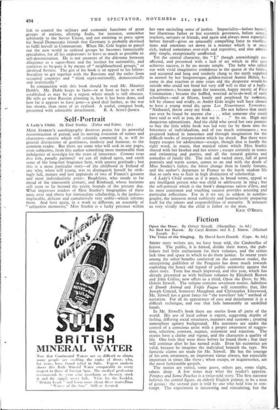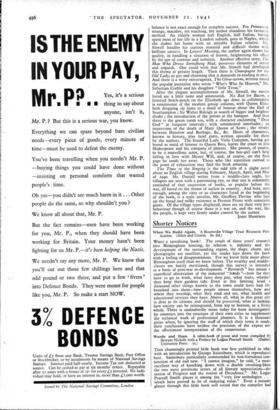Fiction
Open the Door. By Osbert Sitwell. (Macmillan. 7s. 6d.)
The Time of the Singing. By David Scott Daniell. (Cape. 8s. 6d.)
SHORT story writers are, we have been told, the Cinderellas of fiction. The public, it is hinted, dislike their wares, the pub- lishers feel little enthusiasm for their volumes, and the critics lack time and space in which to do them justice. In recent years among the other" benefits conferred on the common reader, the enterprising publisher of the Penguins has done much towards exploding the hoary old legend of public animosity against the short story. Taste has much improved, and this year, which has already presented us with brilliant volumes by Elizabeth Bowen and John Collier, now offers us a third, Open the Door, by Mr. Osbert Sitwell. The volume contains seventeen stories. Admirers of Dumb Animal and Triple Fugue will remember that, like Joseph Conrad, Somerset Maugham and Christopher Isherwood, Mr. Sitwell has a great fancy for " the travellers' tale " method of narration. For all its appearance of ease and detachment it is a difficult technique, and one that fails lamentably in unskilled hands.
In Mr. Sitwell's book there are stories from all parts of the world. His use of local colour is expert, suggesting depths of feeling, differing social structures, manners and customs ; creating atmosphere against background. His narrators are under the control of a conscious artist with a proper awareness of sugges- tion, selection, contrast, nuance, statement and rejection. The stories have a clarity and vigour, and the characters a quality of life. One feels they were there before he found them ; that they will continue after he has turned aside. Even his eccentrics are valid, because he imagines the individual beneath tht. type. No fantastic claims are made for Mr. Sitwell. He has the courage of his own awareness, an important virtue always, but especially important in times like these ; when escape, or acquiescence, are the most fashionable gospels.
The stories are varied, some grave, others gay, some slight, others deep. A few notes may whet the reader's appetite. Pompey and Some Peaches is a twice-told story. The first narrator believes the central figure, an elderly English painter, to be a man of genius : the second part is told by one who held him in con- tempt. The experiment is interesting and stimulating, but the balance is not exact enough for complete success. For Primavera, strange, macabre, yet touching, the author abandons his favourite method. An elderly woman half English, half Italian, having spent most of her life in a London suburb, goes to Naples, where she makes her home with an amiable Italian relative. Mr. Sitwell handles his curious material and difficult theme with brilliant success. In Lovers' Meeting, the author again shows his quality, in handling a situation of horror, heightening his effect by the use of contrast and isolation. Another effective story, The Man Who Drove Strindberg Mad, possesses elements of terror and anguish. One could wish that Mr. Sitwell had developed this theme at greater length. Then there is Champagne for the Old Lady, so gay and charming that it demands re-reading at once, And there is a witty extravaganza, The Glow-worm, written round the popular journalist who wrote " Who's Who In Heaven," Mr. Sebastian Corble and his daughter " little Tessa."
After the elegant accomplishment of Mr. Sitwell, the novels listed are a little tame and amateurish. No Bed for Bacon, a frenzied hotch-potch on the Elizabeth age done in collaboration is reminiscent of the modern gossip column, with Queen Eliza- beth dropping sly hints to a maid of honour about the Earl of Southampton ; Sir Walter Raleigh in search of bigger and brighter cloaks ; the introduction of the potato at the banquet. And then there is the green room too, with a character exclaiming " Dear God " at frequent intervals ; with sentimental interludes ; an impression of the death of Mary Queen of Scots ; the rivalry between Henslow and Burbage, &c., &c. Hosts of characters, known in history, play brief parts, written specially for them by the authors. The beautiful Lady Viola Compton, having got bored as maid of honour to Queen Bess, leaves the court to join Shakespeare and his company of players. She proves, of course, to be a marvellous actor, but, of course, the boy-girl can't help falling in love with Master Will, and, of course, on the final page he sends her away. Those who like repetition carried to the point of exhaustion may find the book amusing.
The Time of the Singing is the odd title of a slight novel about an English village during February, March, April, and May of 1940. Mr. Daniell writes from a middle-class angle, his villagers are seen with a patronising eye, so that one is constantly reminded of that succession of books, so popular before the war, all based on the theme of author in country. And here, sure enough, among the sixty or so characters listed at the beginning of the book, is a male novelist, Mr. Geoffrey Devine. who laps up the bread and milky existence at Preston Priors with conscious gusto. Of the village types displayed, most are on their very best behaviour though of course there is a war on, and the war, like the people, is kept very firmly under control by the author.
JOHN HAMPSON



























 Previous page
Previous page